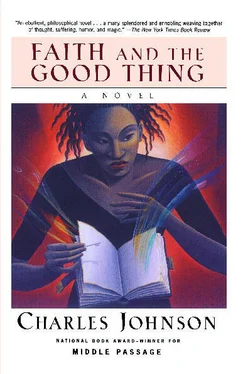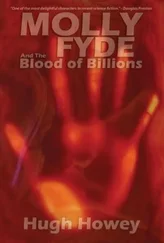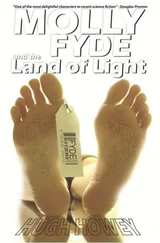(Careful, this is sorcery. If you please, haints — a whole host of them — will be revealed to you, just as sure as hearing a moaning dove will give you a backache, if you look over your left shoulder, or through a needle’s eye, through a mule’s right ear, or into a mirror with another person, though the most certain technique is to break a rain-crow’s egg in a saucer of pond water and wash your face with it twice. If all else fails, wipe off a rusty nail from a minister’s coffin, insert it between your canine teeth, and spirits, like street beggars, will crowd around you. But if you wish to be rid of them forever, say, “What in the name of the Lord do you want with me?” thrice, and the spirit will (a) flee, or (b) carry you to some secluded spot where it’ll bid you dig until you come to a pot of money. Read, if the haint returns, a Bible verse or a prayer backward, but not the Lord’s Prayer, for this, assuredly, will conjure up the Devil and his lieutenants (it is the way of warlocks). Should all these methods fail and spirits still stalk like Jehovah’s Witnesses at your front door, say, “Skit, scat, turn into a bat,” and the apparition (also Jehovah’s Witnesses) will go its tormented way.
Sometimes, when sad, Todd spoke of himself.
Todd Cross never knew his birthdate, never really cared. In the attic of his memory he saw a huge woman in rags, so fat she’d need a shoehorn to get into a bathtub, so dark she needed a license to drink white milk. She was enormous — all over, even her arms, which were as big around as the flanks of a racehorse. In these she carried any number of babies often said to be his brothers and sisters. He remembered a house that rattled in the wind like old bones from an unearthed casket, but nothing more. Because he ran away from the woman. Never a day of education, he said proudly, never learned to read (but you knew he was lying because he listened carefully to the words of book-readers, and filed them away deep in his mind). He remembered vomiting in the hot sun while picking Alabama cotton, and the day he decided to leave that job and wander away his youth from one southern town to another, living off what he earned gambling or stealing. He remembered falling in with a traveling circus; that was in his twenties. He had really wanted to get to Mexico; to adventure just a bit more. But the circus job, watering animals and throwing up tents, appeared one spring in Tennessee. Mexico was forgotten each evening when he stood guard at the main tent, watching the fire-eater, monkeys riding bareback on ponies, acrobats and magicians in the center ring, and the trapeze artist swinging through the air as freely as a fish in the sea. He would never forget this: dry hay and horse manure tickling his nose, whitening his nostrils like those of a weary mule — the heavy musk of the animals, and the half-sober but always captivating ringmaster who called these bizarre acts into being with a wave of his hand: freaks, dog-faced boys, and women in star-spangled leotards, who drank like fish late at night but could walk, with bright parasols in their hands, on wires thin enough to cut you in two. They were loud, these circus people, and coarse, but each was horribly uncommon. And though he could do none of their stunts himself, he, too, felt special — as though he could cleave waves and fell giants if he tried hard enough. The first woman he made love to was the Alligator Girl, who had extraordinary legs but had been disfigured by some skin disease in her childhood. She was the Fat Man’s woman and Todd, to avoid his anger, hit the road again, wandering until he arrived bone-weary in Georgia. He met Lavidia, her mother, and her two sisters in a backwoods Baptist church. Why he was in that church he only vaguely recalled — it had something to do with shooting someone six times in a saloon the night before. Money had been involved. Also, the extra aces and kings he carried in his pants cuff. He remembered sitting at the back of the church with a painful, bandaged cut on his right side just beneath his ribs, hearing the minister shout, “Thank God, we ain’t what we were, are what we are, and can be what we will !” He heard Lavidia and her sisters singing like angels in the choir up front, all of them dressed in stiff white dresses, and their hair newly pressed and slicked down with butter. He saw clearly that if he didn’t settle down, and quick, he’d be dead within a few years, belly-up on some barroom floor. Lavidia, more than any other woman he’d seen, looked exactly like his opposite: that was important. The woman you wed had to be everything you weren’t — sober when you were drunk, calculating to check your impulsiveness, sane and with her feet on the ground, regenerating your strength and her own when something got in your blood like a disease and told you to move. Lavidia was all this, so much so that she ran from him when he approached her after service. Todd was persistent. He bought the best suit he could find, trimmed his sideburns, oiled his skin, and had a barber clip the long hairs hanging from his nose before he called on her. He told her he was a liniment salesman from Philadelphia, and would take her North in his limousine (presently in another town for repairs) to butlers and ballets. To wealth. After the wedding ceremony at her mother’s home, Todd took her to a two-dollar-a-night hotel in town, and from there to the sharecropper’s farm where they had lived ever since. Lavidia never, never forgave Todd for that. The truth of his situation killed her mother with a stroke; her two sisters never came to visit. Yet she couldn’t leave him since Faith followed too soon on the heels of their wedding. So she suffered. Todd told Faith that he suffered, too, because he never wanted to go North in the first place, nor did he want to be a salesman, or own butlers, or do anything other than amble around his farmyard each afternoon and feel loose dirt and green grass between his bare brown toes. They would love each other, he thought; they would eat well, and live off the land, their stomachs full. Their hearts full, too.
Faith, touching his headstone, felt too empty to cry. Todd was dead; that was that. Dead, slain by the hands of three men, each of whom probably unloaded a large quantity of his tension, his vital juices, in Todd’s execution. Dead. Returned to stone or slime. And nothing could change that.
Night rose out of the ground and darkened the headstones. Faith returned to the farmhouse, where she began packing her few possessions. On her bed she heaped several dresses Lavidia had knitted for her during the winters when life was slower on the farm. She placed these in her laundry bag, drew the string, and carried it into the front room. On a large, square strip of cardboard she printed TO CHICAGO in red lipstick, and attached strings to its sides so she could wear it around her neck in case she got lost. Pausing, she noticed Lavidia’s shoes — two big boats of leather as brown as shave grass in September — empty in a corner of the front room. They were creased where Lavidia’s heels once had hung over their backs. But now they were eerie, empty as though Lavidia had been snatched from them at that very spot and transported by giggling demons out of the world. Too, the stillness of the front rooms was frightening. All familiarity had fled from the furniture, and every few moments she had to catch herself from dashing into the kitchen, where she heard a scraping noise. Mice, perhaps the wind: nothing more. She moved through the house from room to room, dousing out the wick-lighted oil lamps and closing doors, perhaps forever. She shut the windows and, on impulse, snatched all the photographs scattered about the house and locked them in a closet. After counting her money — seventy-five dollars — and disposing of Lavidia’s rings and a few hairbrushes, which could be used in conjuration and curses against her mother, she left, looking back down the misty, rain-soaked road occasionally, but glad to be again in the night air.
Читать дальше












